Starting with Windows 7, Microsoft introduced the new taskbar. It allows pinning apps and documents, working with jump lists and shows a progress animation for long file operations. Windows 8.1 and Windows 10 add the ability to pin Store apps to the taskbar. However, these user interface improvements made it harder to open the context menu for the app.
Advertisеment
In an older versions of Windows, it was easy to open the default right-click menu for running apps as well as Quick Launch shortcuts. The taskbar button for running apps had the same menu as the app's window frame, allowing you to close, minimize or maximize the app. This is called the window menu. Due to jump lists, these options are not prominently visible any more in Windows 10. By default, a new (immersive) jump list appears when you right-click an app. Here are a number of ways to open the classic context menu for running apps or pinned apps in Windows 10.
To open the context menu for apps in taskbar, do the following.
- Right-click an app on the taskbar.
- The jumplist will appear.
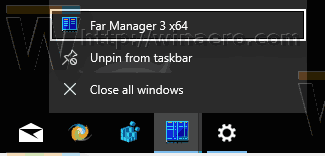
There, right-click the app's name: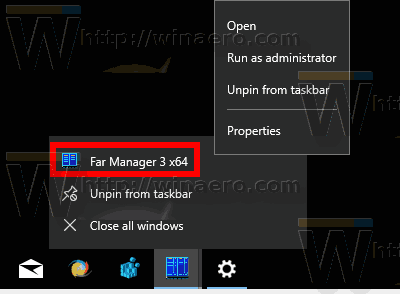
It includes some extra commands like Run as administrator and Properties. - To open an extended context menu, press and hold the Shift key, then right-click the app's name. This will open the menu which contains all the traditional commands.
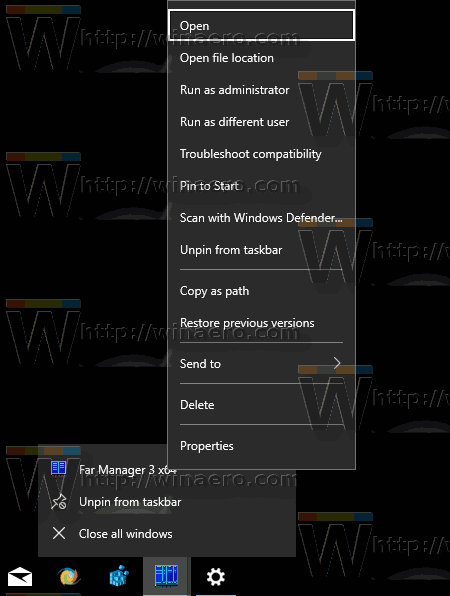
However, none of these context menus include the classic commands to manage the app's window. Here is a simple trick to open it quickly.
- Press and hold the Shift key.
- Then right-click the desired app's icon in the taskbar.
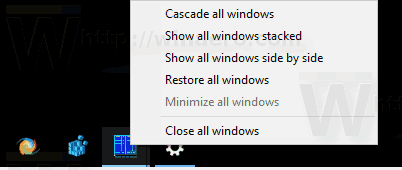
This will directly open the classic context menu with commands like Minimize, Close, etc.
Also, it is possible to open the context menu with hotkeys. Let's see how it can be done.
Open the jumplist for apps in taskbar with hotkeys
- For first 9 pinned and running apps, press Alt + Win + 1..9 to open the jumplist of the app with the keyboard.
 Another way to open the jumplist is as follows:
Another way to open the jumplist is as follows: - Press Win + T to bring the focus to the taskbar app buttons.
- Use the arrow keys to navigate to the desired app or keep pressing Win+T repeatedly until you focus on the app you want.
- Press Shift + F10 to open the jumplist for the app highlighted using Win + T.
Tip: If your keyboard has the "Menu" button next to the space bar, you can use it instead of Shift + F10.
Note: In my case, the key combination Alt + Win + 7 will open the context menu for FAR Manager since it is the seventh app from the left.
- Press Win + T to bring the focus to the taskbar app buttons.
- Use the arrow keys to navigate to the desired app or keep pressing Win + T repeatedly until you focus on the app you want.
- Press Shift + F10 to open the classic context menu. You will see the extended context menu with its classic look.
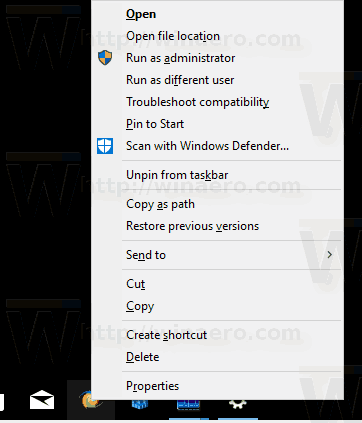
Another way to open the classic context menu is as follows:
- Press Alt + Tab keys to switch to the taskbar app for which you wish to show the classic context menu.
- Press Alt + Space to open the classic context menu.
Note: For running apps, the classic context menu shows minimize/maximize/close, while for pinned apps which are not running, the classic context menu includes the same commands that Explorer shows.
That's it.
Support us
Winaero greatly relies on your support. You can help the site keep bringing you interesting and useful content and software by using these options:
